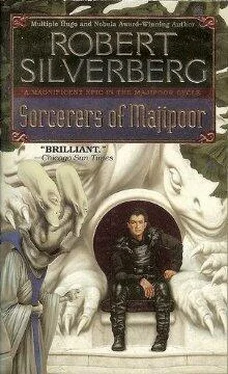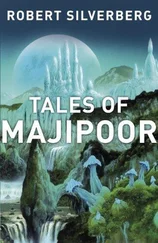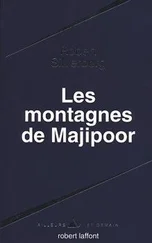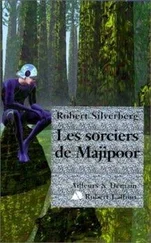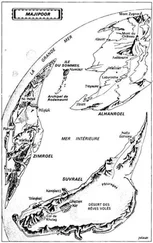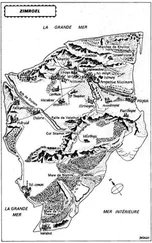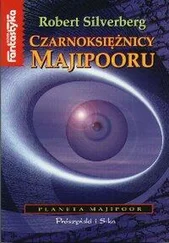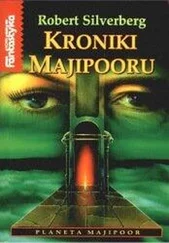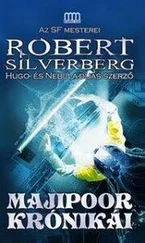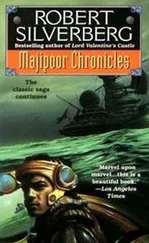All that sounded uncomplicated enough. But the Ghayrogs had not prepared him, any more than Galbifond had, for the austerities of the Valmambra. Had not prepared him for the merciless dryness of the land, where you could go three days at a time without finding a source of water, and what you found then would be brackish. For the air, as dry as the sand beneath his feet, so that breathing it parched the nostrils and made the tongue raw and tender. For the heat of day, which seemed as fierce to Prestimion as he supposed the fabled heat of Suvrael must be. For the chill of night, when the clear air released to the sky all the warmth that had poured in by day, and left him huddled and shivering in whatever shelter he managed to find. For the scarcity of anything to eat, nothing at all for two or three days at a time, then only miserable little dry berries and the stems of some low crooked plant with spiny leaves and—occasionally, very occasionally—the stringy meat of the small gray hopping creature with great curving ears the size of its own head that was the only kind of animal life that seemed to live here. Their hearing was so sensitive that it was impossible for Prestimion to stalk them. But now and again he saw one motionless on a hillside across some barren ravine, and by releasing his arrow swiftly in the direction which he thought the animal would run once it heard the sound of the singing shaft heading its way, he was able to bring it down.
Triggoin was supposed to be on the far side of the desert, but the desert appeared to have no end. Prestimion grew weaker and weaker as the demands the Valmambra placed on his already overtaxed body far exceeded the quantity of food and water he was able to find. He was assailed by fever and dizziness, so that the landscape rocked and lurched before him like the breast of a wild sea; his vision grew blurred, so there was no way for him to use his bow; his feet and legs swelled, making every step an aching torment. The clangor coming from the sun’s inexorable light began again, and would not cease. He imagined the sound of thunder in a place that knew no rainstonns. Great oscillating rings of green light surrounded the sun, filling half the sky, or so it seemed to him. Sun-blisters sprang up along his back and shoulders, and after he lay dozing face downward on the sand for a time when he felt too dizzy to go forward, he arose reddened and swollen from neck to ankles, feeling half cooked, or more than half.
A day or two later he ate something hard and blue, a nut of some kind, that stung his mouth and made his eyelids puff to three times their thickness. He was set upon by a cloud of small golden flies, like a mist of bright metal, that bit him in a hundred places and raised blisters. He came to a tangle of impassable brambles many miles wide that barred his path, so that he had to go a long distance to the east before he found a way to continue on his northward route.
He dreamed of Muldemar House, his bed, his stone bathtub, his wine, his soft clean clothes. He dreamed of his friends. One night in his dreams Thismet came to him and danced and opened her bodice to show him small round breasts tipped with hard dark nipples.
He woke retching, one morning, and spent what seemed like an hour vomiting thin white fluid. He woke sobbing once, which astonished him. The leather of his boots began to split. His toes stuck out; he stubbed one and it bled for two days.
He tried not to think of where he was or what was happening to him. He did not want to consider the prospect that he would die out here, forgotten and unburied.
For a whole day he thought he was Coronal, and wondered why he was not at the Castle. Then he remembered the truth.
Three lean-shanked animals squatted beside him one night as he waited for sleep at the edge of a dry gully, and made cackling sounds that seemed almost like laughter. They had sharp teeth; he wondered if they would fall upon him and eat him. But they did not. They laughed at him some more, and walked in circles around him, and one by one emitted little piles of bright green turds. Then they moved along. They had no use for him.
He came to a river of sand running through the desert. In the midday sun it blazed like a long line of white fire from the quartz crystals that were in it. He knelt and scooped it up in his hands as though it were water, and let it run through his fingers, and once again wept.
He stumbled over a gnarled shrub and twisted his leg. His knee swelled like a balloon. For two days he could put no weight on it, nor could he walk. He crawled. In a broad open place under the merciless sun, he was attacked by a huge carrion-bird, a thing somewhat like a milufta, with terrible bloodshot eyes and a long bare red neck that had loose skin hanging from it in ruffled folds, and a beak like the edge of a scythe. It came flapping down out of the sky, shrieking as though it had eaten nothing in a month, and tried to wrap him in its great ragged-edged wings. “Not dead yet!” Prestimion cried, and rolled over and kicked at it with his good leg. “Not dead, not dead, not dead!”
Evidently it didn’t care. The bird seemed crazed. It must have gone without food so long that it was willing to kill to eat, though it was plainly a carrion-bird. It clawed at him with curved yellow talons and drew blood from him in half a dozen places. It snapped at his throat, at his eyes. It tore at him and ripped a strip of flesh from his arm, and came back for more. “Not dead yet!” Prestimion kept saying as he struggled to beat the bird away from him. “Not dead!” It was the first time he had spoken aloud in days.
The reek of its breath sickened him and the pain where it had ripped him was like a line of white fire. He lay on his back and kicked and pummeled at it as it fluttered and flurried about him. If it would only fly upward a little way, he would try to put an arrow through its belly; but no, no, it hovered close against him, frantically biting and clawing, wounding him again and again, until somehow in a burst of desperate fury he caught it by its long scrawny neck, wrapped one arm about it and brought a rock down against its skull over and over with his other hand.
It fell away from him and lay limply, flapping its wings slowly for a time, and then no longer moving. When it was done with the last of its death-spasms, Prestimion rose and walked over to it, and saw that itwas a monster nearly as big as he was. The thought came to him that its meat might be edible; but the thought of eating that creature was so revolting to him that he began to vomit once again, and vomited up the emptiness that was within him for an endless time.
Afterward he bandaged the deepest wound with cloth torn from his undershirt. And then he arose and went liniping onward. Before long he ceased to note the pain, though blood seeped through all day to his outer garments. He had begun to forget how to feel pain.
But then one day he was simply unable to go on at all.
It seemed to him that he must have been heading in the proper direction all this while, but there was no sign yet of the village of Jaggereen, and he had had nothing at all to eat in several days, no leaves, no roots, no insects or crawling things, even, and no water except what he had been able to lick from a flat rock that had a tiny trickle running along its face from somewhere. And now his strength was exhausted. This was, he knew, the end. All his proud ambitions would reach their termination in this forlorn place, and no one would ever know what had become of him, and in time the world would forget that there had ever been such a person as Prestimion of Muldemar, who might once have had his name inscribed in the list of kings.
He lay down in the shade of a tall rock, placed his pack on one side of him and his bow on the other, and closed his eyes, and waited. How long, he wondered, would it take death to come for him? An hour? A day? Already he felt time slowing to a halt. His mouth had the taste of dust and his breaths came so infrequently that each one was a surprise to him. Once in a while he opened his eyes and saw only a vague reddish swirl before him. Then for along time he lay quite still, and the mere idea of movement struck him as impossible of fulfillment, and it occurred to him that he might already be dead. But no, no, he heard himself draw another breath.
Читать дальше
